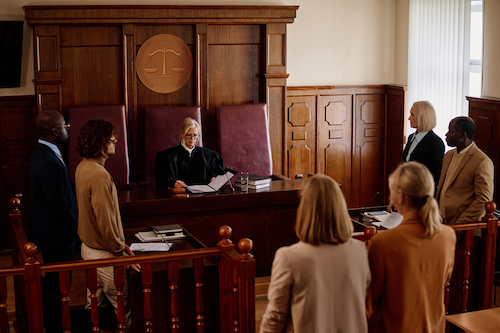
The New Jersey Supreme Court recently heard oral arguments in State v. William Hill, which challenges the constitutionality of the state’s witness tampering statute. The defendant, William Hill, argues that the statute is unconstitutionally overbroad and vague.
Appellate Division Decision
While awaiting trial for a violent carjacking, William Hill mailed a letter to the home of his alleged victim. While the contents of the letter were non-threatening, referenced his faith in God, and even contained a smiley face, he was charged with witness tampering.
The witness tampering statute, N.J.S.A. 2C:28-5(a), provides that a witness tampering offense is committed if a person knowingly engages in conduct which a reasonable person would believe would cause a witness or informant to do one or more specified actions, such as testify falsely or withhold testimony. Hill maintains that the “reasonable person” feature renders the statute unconstitutional and, to avoid constitutional infirmity, the statute must be construed to require the State to prove the defendant knew his or her conduct would cause a prohibited result.
The Appellate Division disagreed. “After carefully examining the relevant precedents in light of the arguments of the parties and amici, we conclude N.J.S.A. 2C:28-5(a) is neither unconstitutionally overbroad nor impermissibly vague,” the court wrote. “We decline to embrace a new rule that categorically prohibits the Legislature from using an objective ‘reasonable person’ test to determine a defendant’s culpability.”
With regard to the defendant’s overbreadth argument, the Appellate Division found that a defendant awaiting trial has no First Amendment right to communicate directly with the victim of the alleged violent crime. “Were it otherwise, a court setting the conditions of pretrial release under the Criminal Justice Reform Act, N.J.S.A. 2A:162-15 to -26, might be foreclosed from imposing a ‘no contact’ order,” the court wrote.
With regard to whether the witness tampering statute is impermissibly vague, the Appellate Division again rejected Hill’s argument. In reaching its decision, the appeals court emphasized that the statute’s objective reasonable-person standard is vastly different from a subjective standard set forth in a bias-crime statute, which was struck down by the New Jersey Supreme Court in New Jersey v. Pomianek, 221 N.J. 66 (2015).
The Appellate Division further noted that the objective “reasonable person” formulation employed in the witness tampering statute appears throughout the New Jersey Code of Criminal Justice. “In these circumstances, we decline to create a new categorical rule that would invalidate the use of an objective reasonable- person test for determining criminal culpability,” the court wrote.
Issues Before the NJ Supreme Court
The New Jersey Supreme Court granted certification on May 9, 2023. The justices agreed to consider the following question: “Is the witness tampering statute, N.J.S.A. 2C:28-5(a), unconstitutionally overbroad?”
During oral arguments held on October 10, 2023, Hill’s attorney argued that the letter was constitutionally protected free speech. “The presumption especially under the state constitution is that speech is protected… even if speech might be alarming or disfavored speech we don’t like,” assistant deputy public defender John P. Flynn argued.
In response, Patrick R. McAvaddy, an assistant prosecutor in the Hudson County Prosecutor’s Office, emphasized that Hill sent his letter to the victim’s home, “making it clear to her that he knew who she was, where she lived, and that he was willing to act on that knowledge.”
Several justices asked when it would be acceptable for a defendant to contact a victim. “Your position is that a defendant charged with committing a crime has the First Amendment right to contact the victim awaiting trial?” Justice Douglas Fasciale asked Flynn. Meanwhile, Justice Michael Noriega directed his question to McAvaddy, asking: “Under your theory of prosecution there, is it fair to say that a defendant is uniformly barred from ever contacting a victim outside of the context of a no-contact order?” At this point, it is unclear how the justices will rule. We will provide an update once the court renders a decision.
